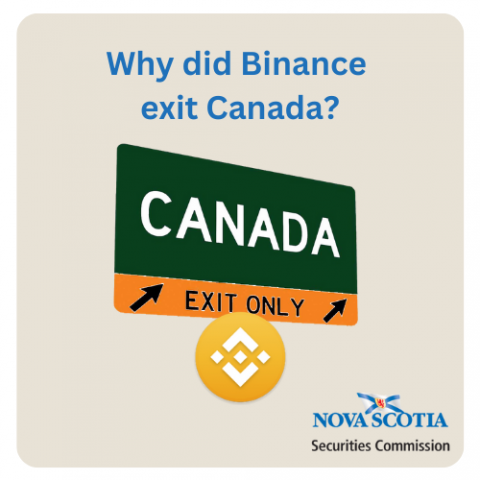Submitted by nsscadmin on

Special Guest Blog from Doug Harris, General Counsel, Director of Market Regulation and Policy, and Secretary to the Commission
As we’ve discussed before, crypto asset trading platforms (CTPs) must be registered with securities regulators to legally offer crypto asset trading services to investors in Nova Scotia.
To make it easier for Nova Scotia investors to determine if a CTP is registered, we maintain a page on our website that lists all CTPs registered in Nova Scotia.
You may have seen reports that the world’s largest CTP, Binance, is ceasing its operations in Canada. (Binance had already ceased operations in Ontario at the end of 2021.) Binance’s Canadian clients have received information about what will happen with their accounts.
In announcing its departure from the remaining provinces and territories, Binance stated that “new guidance related to stablecoins and investor limits provided to crypto exchanges makes the Canada market no longer tenable for Binance at this time”. This was a reference to our recent Notice, in which we described recent insolvencies involving a number of CTPs (including Voyager Digital, Celsius Network, the FTX group of companies, BlockFi and Genesis Global), and announced that we were introducing important new investor protection provisions.
Among other things, we announced that:
· all unregistered CTPs operating in Canada, including Binance, would be required to enter into an agreement with regulators to implement important investor protection measures; and
· that agreement would prohibit CTPs allowing investors to buy or deposit “Value-Referenced Crypto Assets” (or VRCAs, commonly referred to as stablecoins) without the consent of Canadian securities regulators.
Regarding investment limits, as is the case with many registered CTPs, Binance would have been required to limit the amount of certain crypto assets that a Nova Scotia investor could trade on the platform over a 12-month period, although this limitation would not apply to Bitcoin or Ether. We believe that this is an important safeguard to reduce the risks to Nova Scotia investors of trading even on registered CTPs.
Regarding VRCAs, we used that term because, despite their usual name, recent events have shown some stablecoins to be anything but “stable” (Basis Cash, Iron and Terra being recent examples).
We explained that the transparency of VRCA arrangements about their reserves of assets, the stabilization mechanisms of their value and their governance are generally key issues that require appropriate regulation to protect VRCA holders. Currently, VRCA holders may not receive important information about the issuer or key features of the VRCA. Thus, they may not be aware of their rights and risks when trading such assets. In addition, investors may be misled into believing that VRCAs are risk-free, that their price will not deviate from its reference value (both in the normal markets and during difficult events) or that they have a direct claim on the reserve of assets. The redemption rights on VRCAs are left to the discretion of the issuer and are not always clearly disclosed.
We therefore announced that any CTP that wished to allow investors to use a VRCA would have to contact us to discuss the specific characteristics of the VRCA so that we could ensure that appropriate additional investor protection measures were in place. Finally, we explained that our approach to VRCAs is an interim approach only, as we continue our work in this area.
Binance’s decision to cease operations in Canada means that it did not enter into the agreement described in our Notice. However, ten other unregistered CTPs did enter into the required agreements (which are posted on the CSA website) to work with Canadian regulators to protect investors as they continue the process of becoming registered. These are in addition to the ten CTPs that are already registered. We are encouraged by the fact that so many CTPs have agreed to these important investor protection measures in connection with their operations in Canada.
